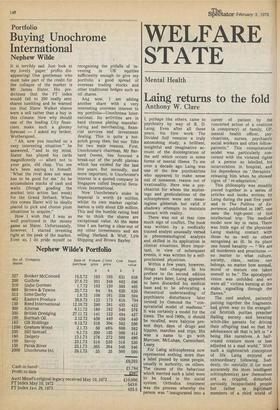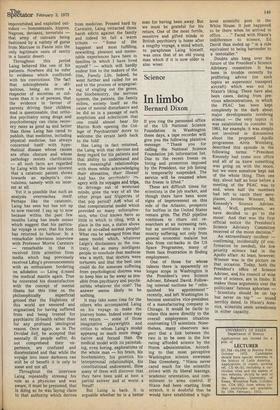Mental Health
Laing returns to the fold
Anthony W. Clare
I, perhaps like others, came to psychiatry by way of R. D.
Laing. Even after all these years, his first work The Divided Self remains a truly astonishing study, a brilliant, insightful and imaginative account of the disintegration of the self which occurs in some forms of mental illness. To me over a decade ago Laing was one of the few psychiatrists who appeared to make sense out of nonsense, reason out of irrationality. Here was a psychiatrist for whom the mutterings and gesticulations of the schizophrenic were not meaningless gibberish but valid if shadowy attempts to maintain contact with reality.
There was not at that time much sign of conflict. The book was written by a medically trained analyst unusually versed in phenomenological analysis and skilled in its application in clinical situations. More important, in view of subsequent events, it was written by a selfproclaimed physician.
• Within a few years, however, things had changed. In his preface to the second edition four years later, Laing appeared to have discarded his medical base and to be advocating a theoretical understanding of psychiatric disturbance later termed by Osmond the "conspiratorial model of madness." It was certainly a model for the times. The mid-1960s, it should be recalled, were halcyon protest days, days of drugs and hippies, marches and trips. His was a name to go with Marcuse, McLuhan, Carmichael, Leary.
For Laing schizophrenia now represented nothing more than a label pinned by some people, usually in authority, on others. The causes of the behaviour which merited such a label were to be found in the social system. Orthodox treatment was the process whereby the person was "inaugurated into a career of patient by the concerted action of a coalition (a conspiracy) of family, GP, mental health officer, psychiatrists, nurses, psychiatric social workers and often fellowpatients." This conspiratorial model was particularly concerned with the violated rights of a person so labelled, his incarceration in hospital, and his dependence on ' therapists ' releasing him when he showed signs of 're-adaptation.'
This philosophy was steadily pieced together in a series of articles and books written by Laing during the past five years and in The Politics of Experience, published in 1967, one sees the high-point of this intellectual trip. The medical model now lay in ruins. There was little sign of the physician Laing making contact with those he as well as others recognised as ill. In its place one found banality — "We are all murderers and prostitutes — no matter to what culture, society, class, nation one belongs, no matter how normal, moral or mature one takes oneself to be." The apocalyptic vision was ,unfolded and we were all "victims burning at the stake, signalling through the flames."
The cool analyst, patiently putting together the fragments, had given way to the evangelical Scottish puritan preacher flailing society and berating witch-like parents for driving their offspring mad so that by adolescence all that is left is " a being like ourselves. A halfcrazed creature more or less adjusted to a mad world." With such a nightmarish conception of life Laing enjoyed an extraordinary following. Suddenly, the mentally ill (or more accurately the more intelligent schizophrenics) saw themselves not as crippled, disturbed, seriously incapacitated people but rather as legitimate members of a third world of impoverished and exploited outsiders — homosexuals, hippies, Negroes, deviants, terrorists — that army of outcasts being fashioned by a variety of gurus from Marcuse to Fanon into the only legitimate oasis of sanity in a lunatic desert.
Throughout this period Laing behaved like one of his patients. Nowhere did he refer to evidence which conflicted. with his convictions. The fact that schizophrenia is utiquitous, being •no more a respecter of societies or cultures than it is of persons, that the evidence in favour of parents driving their children mad is questionable, that orthodox psychiatry using drugs and psychotherapy can claim recovery rates as good as and better than those Laing has cared to publish, that medicine, including physical medicine, has always concerned itself with hypothetical disease whose causes are often obscure and whose pathology resists clarification — all such facts are regarded by Laing with the same interest that a catatonic patient shows towards an epileptic's convulsions, namely with no interest at all.
Yet it is possible that such an analysis overreaches itself. Perhaps like the catatonic, Laing has seen but has not up to now reacted. I say up to now because within the past few months Laing has made noises which suggest that his particular voyage is over, that his boat has returned to harbour. In a remarkable television interview with Professor Morris Carstairs — remarkable in that it received little attention from media which had previously received Laing's pronouncements with an enthusiasm bordering on adulation — Laing donned the medical mantle again. True he reiterated his dissatisfaction with the concept of mental illness but this time on the philosophically superficial ground that the Eagletons of this world are smeared and stigmatised for having suffered from and being treated for psychiatric ill-health rather than for any profound ideological reason. Once again, as in The Divided Self, he accepted that mentally ill people suffer, do not comprehend their experience, are confused and disorientated and that while the voyage into inner darkness can still be of benefit it is only to some and not ell.
Throughout the interview Laing repeatedly stressed his role as a physician and was aware, it must be presumed, that in doing so he was laying claim to that authority which derives from medicine. Pressed hard by Carstairs, Laing retracted those harsh edicts against the family and indeed let fall a warm tribute — "Some of the happiest and most fulfilling, rewarding, pleasant and memorable experiences have been in families in which I have lived myself" — which will hardly endear him to the makers of the film, Family Life. Indeed, he went further and called for an end to the process of scapegoating, of singling out the genes, the biochemistry, the nervous system, the patents, the family milieu, society itself as the cause of mental disturbance and he did so in a passage of such scepticism and eclecticism that one could almost hear Sir Martin Roth opening the College of Psychiatrists' doors to welcome the errant lamb back to the fold!
Has Laing in fact returned, the Laing with that obvious and deep regard for his patients and that ability to understand and form meaningful relationships with them while acknowledging their alienation, their illness? And has the nsycheclelic imagery with its voyages and trips, its drivings out of wretcned minds, gone the way of all the other props and fripperies of that pop period? Anti what of that conspiratorial model which provided so many schizophrenics, who God knows have so little to which to cling, with a place in the sun, a status above that of so-called normal people? What can be salvaged from that same model which, whatever Laign's disclaimers to the contrary, led so many intelligent people to conclude that madness was a myth, that doctors were torturers and that the best one could do for someone suffei ing from 'psychological distress was to keep him as far away as pos sible from psychiatry and psychiatrists whatever the cost? The answer seems likely to be nothing.
It may take some time for the others who accompanied Laing on his voyage to make the journey home, Indeed some may not return — some of those imaginative playwrights and critics to whom Laing's model appeared so much more imagi native and fecund than the medical model with its painstaking, even boring, explorations of the whole man — his brain, his biochemistry, his genetics, his interpersonal relationships, his constitutional endowment. How many of them will discover that they have been sold at best a partial answer and at worst a fraud?
But Laing is back. It is arguable whether he is a better man for having been _away. But we must be grateful for his return. One of the most fertile, sensitive and gifted minds in British psychiatry is home after a lengthy voyage, a mind which, to paraphrase Laing himself, was once that of an old young man which if it is now older is also wiser.



































 Previous page
Previous page